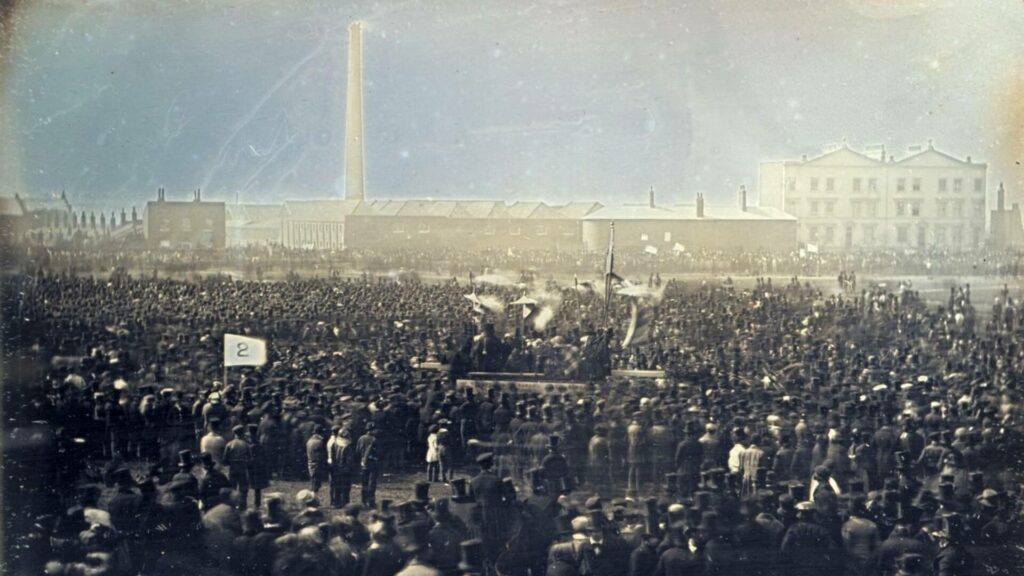A new book gives the reader interested in Modern Greek history the opportunity to place the momentous events of the Greek war of independence (1821-29) into its European context. For the successful outbreak of the Greek revolution and its ultimate success with the establishment of the modern Greek state occurred in an era of great change in European history.
Australian-born Cambridge University Professor Christopher Clark is a major historian of European history. His works include studies of Prussia and the creation of the new German state (Iron Kingdom) and the drift towards the First World War in Europe (The Sleepwalkers).
Clark has now turned his attention to an often overlooked era in modern European history – the revolutions of 1848-49. As a student of modern European history at Monash University in the late 1970’s I can remember listening to lectures on this era. But the study of this time seems to have lapsed, being replaced by other focuses – on the outbreak and course of the wars of the 20th century, the revolutions following the end of WW1 and the consequences of the end of WW2, the Cold War and its end with the fall of Communism in Europe. This major new work seeks to restore the events surrounding the 1848 revolutions to their rightful significance. And in so doing he challenges us to look again at the outcome of the Greek revolution through this wider European lens.
Revolutionary Spring is a magnificent 800 page tour de force. His study begins with a detailed description of the economic, social and political dynamics which contributed to the widespread discontent across many European countries in the years prior to the revolutions and ultimately to the outbreak of the revolutions itself.

The book takes the reader across the various spontaneous outbreaks – from Germany and France, Austria and Hungary, Italy, and Poland, and beyond – explaining their local factors and nuances as well as the common threads connecting them and propelling what became a European movement in support of national independence and democratic change, against the many imperial and authoritarian regimes which dominated the European landscape. As Clark says these constituted a transcontinental cascade of revolution across Europe, assisted by political connections and the proliferation of the liberal media of the day.
One of the most important arguments made by Clark is that the revolutions were remarkably successful, if not in the short term but definitely in the long term. The uprisings’ early success in forcing the authorities to grant new democratic constitutions and parliaments with associated social freedoms were in most cases short lived. He argues that much of this failure was due to the division between the revolutionaries, between radicals and liberals, as well as the violent counter-revolutions they had to face.
Yet Clark successfully puts the case for the long term impact of the revolutions. As Clark said in a recent interview on the ABC the revolutions of 1848-49 were not failures but rather can be seen as the “monster event at the heart of the 19th century, everything is changed by it … a really fundamental period of rupture and transformation”. Clark explains how the revolutions not only established many continuing successes (such as the establishment of democratic constitutions and parliaments in Prussia, Piedmont, Holland, Switzerland and Denmark) but the social and national reforms they sought would be ultimately successful. Even where the reformers failed – such as the Chartists in England, 150,000 of whom would rally on Kennington Common in 1848 – their goals of a democratic reform would be ultimately successful.
When we look at the Greek revolution one usually focuses on the various local factors that created the environment for change. No doubt these were very important – the oppression of the Ottoman authorities, economic and social conditions, the lack of political development and desire to be free of Ottoman rule. But the influence of European political and social movements also played a key role. These influenced some of the key leaders of the revolution and they motivated the many non-Hellenes who flocked to Greece to fight on the side of national liberation.
The desire for change, for democracy and for national independence from Imperial control was a widespread concept in the years leading up to and after the outbreak of revolutions in 1848-49. Opposition to foreign rule had been one of the motivations of the philhellenes who flocked to support Greece. Many of these same fighters were present in the risings against Imperial rule in Italy and Poland. Francesco Anzani, a veteran of the Greek war of independence, would also support the July 1830 revolution in France and become a close associate of Garibaldi during his exile in Latin America, joining his Italian Legion as it fought against Brazilian Imperial rule on the 1830’s. And many of the survivors of these campaigns would go on to support the 1848-49 risings.
The connections between the various national movements are reflected in the very words of the original extensive text from which the Hellenic national anthem draws its source. As Clark points out the author – Dionysios Solomos – had lived in Italy, identified with the Italian supporters of independence from Austria and included references to this in his text, with its allusion to the Habsburg eagle feeding its wings and claws on the guts of Italians.
Yet the counter-revolution would see many former philhellenes pay with their lives, like the former watchmaker and café owner Georg Bohning. He had survived his service in Greece with the Swiss Legion and went on to take part in the national uprisings in Germany in 1848-49. Clark writes that he cut a dashing figure, with long hair and bushy beard, a red scarf, loose shirt and a broad- brimmed hat. He was executed in August 1848, sauntering to his place of execution, smoking a cigar, refusing a priest or a blindfold and wishing vengeance on his murderers.
The renewed spirit of reaction which followed the uprisings across Europe would also have its reflection in Greece. It is estimated that over 1,000 former revolutionaries fled the reprisals in their home countries for exile in Greece by the end of 1849, most of these from Italy, some from Poland, the exiles settling in Syros, Patras and Athens.
The historian Christos Aliprantis has written that while the exiles were initially given assistance by the Greek populace and government, soon the Greek authorities became concerned that the presence of hundreds of armed and war-trained ex-revolutionaries could upset the political balance in the new Greek state. A new conservative government appointed by King Otto in December 1849 instituted movement restrictions and police surveillance of the exiles, deporting the most prominent Italian and Polish exiles. In this they were encouraged by the Austrian Empire, whose diplomatic, secret police and other representatives were active in monitoring and promoting a counter-revolutionary approach by Greece, as historian Aliprantis has shown. No doubt King Otto’s family connections to Austria would have helped. This approach mirrored the reaction against the revolutions across the rest of Europe.

This reaction would also impact on those Hellenes who sought an end to British rule of their Ionian Islands. The outbreak of the European revolutions saw the establishment of political clubs and agitation across the Ionian lands. This was followed by a rising in late 1849, the repression of which by the British authorities is considered comparable to the counter-revolutionary violence in Austria and Naples. Yet the spark released in 1848 (and before) could not be contained for long and British rule would end in 1864 with the joining of the Ionian Islands to Greece.
Anyone interested in learning more about the European context in which the Greek revolution took place could do much worse than read Clark’s new book. Indeed a reading of Revolutionary Spring will provide a more profound understanding of the external forces that impacted on the Greek revolution and continued to do so in the years that followed. In many respects the successes and disappointments of the new Greek state were uncannily similar to those other Europeans who fought against the forces of reaction in the hope of establishing a more democratic future. Clark makes a good case for the long-term impact and success of Europe’s Revolutionary Spring and the same could be said if one takes the long few on the development of modern Greece.
Christopher Clark’s Revolutionary Spring: Fighting for a New World 1848-49 is published by Allen Lane/Penguin and is available from all good bookshops.
Jim Claven OAM is a trained historian, freelance writer and published author. His most recent publication is From Imbros Over The Sea – Imbros and Gallipoli Revealed, a companion volume to his recent Imbros & Gallipoli pictorial exhibition curated for the Imvrian Society of Melbourne. Readers are referred to Christopher Clark’s interview on ABC Radio’s Late Night Live available on-line and Christos Aliprantis’ articles on the experience of the exiles in Greece published in the Journal of Modern Greek Studies (May 2019) and the European History Quarterly (2020). Jim can be contacted via email – jimclaven@yahoo.com.au.







